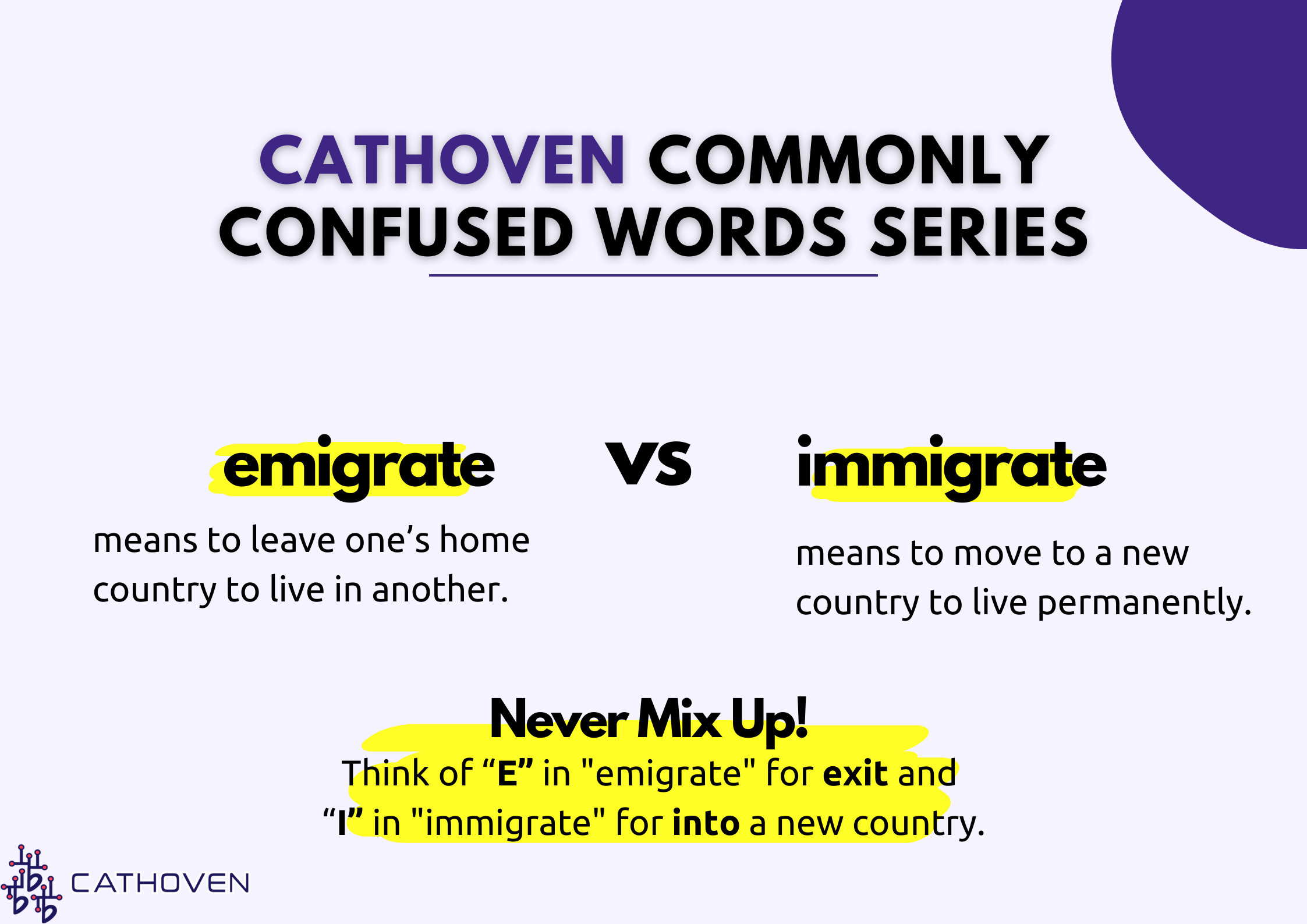“Emigrate” and “immigrate” are two terms that deal with the movement of people from one country to another. While they are often confused, they have distinct meanings. Understanding when to use “emigrate” versus “immigrate” is essential for accurate communication, especially in discussions about migration.
In this post, we’ll break down the difference between “emigrate” and “immigrate,” provide examples of how to use each term correctly, and include CEFR insights to guide learners at different levels.
What is emigrate?
To “emigrate” means to leave one’s own country to live in another. The key focus is on the departure from the original country.
- CEFR Level: B1
“Emigrate” is typically introduced at the intermediate level as learners start to deal with more complex vocabulary and global topics.
Examples of “emigrate” in sentences:
- Many people emigrate from their home countries in search of better opportunities. (B1)
- General example of the action of leaving a country.
- Her family emigrated from Russia to the United States in the 1990s. (B2)
- More specific context showing emigration with details about origin and destination.
What is immigrate?
To “immigrate” means to enter and settle in a new country where you were not born. The key focus is on the arrival in a new country.
- CEFR Level: B1
“Immigrate” is also typically introduced at the B1 level, often alongside “emigrate” in discussions about migration.
Examples of “immigrate” in sentences:
- Many people immigrate to the U.S. every year. (B1)
- General example showing the act of arriving in a new country.
- She immigrated to Canada to pursue a better education. (B2)
- More detailed sentence demonstrating the reason for immigration.
Examples for Using “Emigrate”
B1 Level (Intermediate):
- Thousands of people emigrate from rural areas to cities every year in search of jobs.
- Focus on movement from one place to another.
- During the 19th century, many Europeans emigrated to America for a better life.
- Example showing a historical context of emigration.
B2 Level (Upper-Intermediate):
- His grandparents emigrated from Poland to escape political persecution.
- More specific example showing a reason for emigration.
- The political instability forced the family to emigrate to a neighboring country.
- Example connecting emigration with a cause (political instability).
C1 Level (Advanced):
- She chose to emigrate after receiving a job offer from a multinational company abroad.
- More nuanced example showing a personal decision related to career.
- Many skilled professionals emigrate due to better career prospects in developed nations.
- Demonstrates more abstract use of emigration linked to economic migration.
Examples for Using “Immigrate”
B1 Level (Intermediate):
- People immigrate to large cities for better job opportunities.
- Simple sentence demonstrating the movement into a new country or region.
- She immigrated to Germany after marrying a local citizen.
- Example connecting immigration with a specific personal event.
B2 Level (Upper-Intermediate):
- Many families choose to immigrate for a better education for their children.
- More complex reasoning behind immigration.
- He immigrated to Australia to start his own business in the tech industry.
- Example showing professional motivation for immigration.
C1 Level (Advanced):
- Immigrating to a new country can be challenging, especially when adapting to a different culture and legal system.
- Advanced usage, focusing on the broader challenges of immigration.
- Many immigrants have made significant contributions to the economic and cultural landscape of their new homes.
- A more abstract sentence, highlighting the positive outcomes of immigration.
Key Differences Between Emigrate and Immigrate
- Emigrate: The act of leaving one’s home country to settle in another. Focus is on the departure.
Example: He emigrated from Italy to Australia. - Immigrate: The act of coming into a new country to live permanently. Focus is on the arrival.
Example: She immigrated to the U.K. last year.
A helpful way to remember the difference is that “emigrate” starts with E (for exit) and “immigrate” starts with I (for into).
Practical Applications
Cathoven’s AI-powered tools can assist teachers and learners in practicing important concepts through real-life scenarios. For example, the Exercise Creator allows you to generate comprehension exercises by simply providing a text. To make it easier, we’ve created an example text for you—just click ‘use example text‘ to get started. Once the text is in place, you can create multiple-choice questions, true/false, and short-answer questions.

Click the “use an example text” below and start creating questions to measure your students’ understanding of emigrate and immigrate!
Try with your own text right now (simple version)
Multiple choice
Number of remaining chances: 3
The result will be shown here:
*No credit card or upfront payment required to use
Frequently asked questions about rows and columns
"Emigrate" means to leave one’s home country to live in another.
"Immigrate" means to move to a new country to live permanently.
Think of E in "emigrate" for exit and I in "immigrate" for into a new country.
